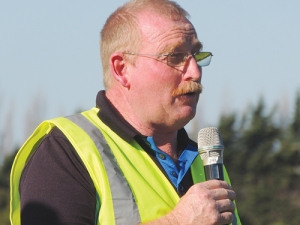Wired for Science: Understanding the feeding habits of mealybug
Fussy children might be frustrating, but fussy mealybugs could help protect the New Zealand wine industry from grapevine leafroll-associated virus 3.
 A 42-day round and fine weather’s built LUDF average cover to just over 2600kgDM/ha, according to farm manager Peter Hancox.
A 42-day round and fine weather’s built LUDF average cover to just over 2600kgDM/ha, according to farm manager Peter Hancox.
In February the management team at Lincoln University were wringing their hands as the season appeared to be turning to custard, but at the latest field day the tone was much more upbeat.
Nips and tucks rather than drastic cuts is how Lincoln University’s Dairy Farm (LUDF) is meeting the challenge of low payouts.
The high profile unit held one of its quarterly focus days earlier this month and revealed it’s on course to beat budget cash farm working expenses this season by nearly 3%. That’s despite a dry season dictating more irrigation than usual and 15% of pasture being renewed.
Milk output is back 3.3% but from 11% fewer cows with 43% less nitrogen fertiliser and 48% less imported silage.
“These are an impressive set of metrics and I have to say we’re a little bit proud of them,” Ron Pellow of the South Island Dairy Development Centre told the focus day.
“We have shown [reduced stocking rate and inputs] can be a profitable outcome, the profit, of course, being relative to what the payout is doing.”
Pellow says he’s eager to see how, come July, LUDF’s final profit will compare against the half dozen top performing Canterbury dairy farms which it has benchmarked itself against in previous years.
Expanding on the detail of LUDF’s season, farm manager Peter Hancox says production is now forecast at 272,500kgMS compared to 280,000kgMS budgeted.
Offsetting that, $5722 and $7106 has been saved on silage purchase and making, while lower use of gibberlin saved $3524 and nitrogen price cuts another $13,169.
“When we set the budget, nitrogen was about $700/t and it’s come down to the high $500s, and we’ve used slightly less,” said Hancox, reflecting on the 143kgN/ha applied.
Regrassing costs have also come in well under budget at $24,000 instead of the planned $37,000 thanks to direct drilling one of three paddocks, and a dry spring reducing damage so less over-sowing was needed.
Not employing any casual staff and delaying replacing a staff member who left late March leaves $9647 extra in the bank on budgeted employment costs of $260,000, and vehicle expenses are down nearly $11,000 from a planned $31,336 thanks to cheaper fuel, less mowing, and repairs and maintenance savings.
Insulating milk silos and upgrading refrigeration equipment has helped shave nearly $8000 off the forecast $30,200 electricity bill, irrigation excluded.
Increased irrigation owing to the dry season put all irrigation costs, electricity included, 25% over budget at $76,878 to the end of March, and with unseasonably warm, dry nor-west weather earlier this month it was possible the pumps could be back on again, the field day attendees heard.
But the biggest budget blow-out is replacement grazing and meal costs – mainly more milk powder and calf meal, taking $19,791 more than planned off the bottom line.
Animal health and breeding costs are also up on budget.
Adding it all up, farm working expenses (FWE) to the year end for the 167ha, 560-cow unit, are now forecast at $1.099m compared to $1.131m budgeted, but with production down 2.7% on budget the reduction in FWE/kgMS is just one cent, from $4.04/kgMS to $4.03/kgMS, with a cash operating surplus of $1929/ha compared to $1963/ha budgeted.
Asked whether the budget for next year would be much different, Hancox said it wouldn’t be.
Global trade has been thrown into another bout of uncertainty following the overnight ruling by US Supreme Court, striking down President Donald Trump's decision to impose additional tariffs on trading partners.
Controls on the movement of fruit and vegetables in the Auckland suburb of Mt Roskill have been lifted.
Fonterra farmer shareholders and unit holders are in line for another payment in April.
Farmers are being encouraged to take a closer look at the refrigerants running inside their on-farm systems, as international and domestic pressure continues to build on high global warming potential (GWP) 400-series refrigerants.
As expected, Fonterra has lifted its 2025-26 forecast farmgate milk price mid-point to $9.50/kgMS.
Bovonic says a return on investment study has found its automated mastitis detection technology, QuadSense, is delivering financial, labour, and animal-health benefits on New Zealand dairy farms worth an estimated $29,547 per season.

OPINION: Here w go: the election date is set for November 7 and the politicians are out of the gate…
OPINION: ECan data was released a few days ago showing Canterbury farmers have made “giant strides on environmental performance”.